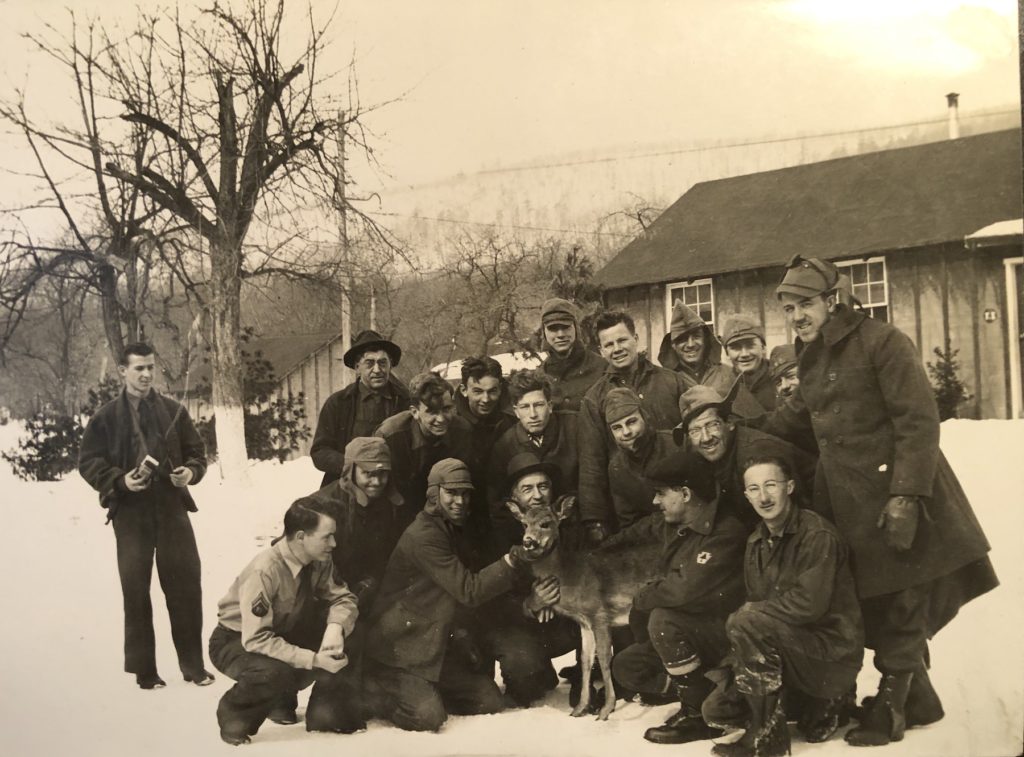“Go out in the woods, find yourself, young man.”
(“Ridge Runner” by Van Wagner, CCC Legacy Day 2022)
Poe Valley and Poe Paddy state parks would not exist today if not for the young men of Company 1333 in the Civilian Conservation Corps. Their camp, Poe Valley Camp S-63, was one of 151 CCC camp sites in Pennsylvania from 1933 to 1942.
William “Bill” Marcum, CCC historian and author from Coburn, has made it his mission to share this history ever since he inherited a wooden chest from his grandfather that contained a treasure trove of CCC artifacts. His grandfather was a skilled foreman at Poe Valley; his story and that of the “boys” he mentored is written in Bill’s book: The Foreman’s Boys: The Story of Civilian Conservation Corps, Company 1333, Camp S-63, Poe Valley.
During the Great Depression, President Franklin Delano Roosevelt’s New Deal included emergency conservation work employing men ages eighteen to twenty-six in restoring America’s timbered ruins. The CCC program filled two needs: helping to reduce unprecedented unemployment and rescuing America’s natural resources, which had suffered from unsustainable industrial practices. This was a trying time for Americans; Centre County lost one quarter of all of its businesses before the end of the Depression.
Applicants were only eligible to join the CCC if their family was listed in county relief rolls. Regardless of any stigma, a six-month “hitch” in the CCC provided three square meals a day. Enrollees were also paid a dollar a day, $5 a month of which they got to keep; $25 was allocated to send back to their families. Most of these enrollees didn’t talk much about their time in “three Cs,” and their efforts were also overshadowed by the second World War. Bill remarked, “It takes time for history to become history” and for people to appreciate history, too. Now families are learning everything they can to honor the memory and legacy of their relatives who served in the CCC.

Each year, on the last Sunday of July, Legacy Day of the CCC at Poe Valley State Park celebrates this essential yet overlooked chapter in history. Bill has been hosting gatherings like this for the broader CCC community since 1983. Initially, the reunions focused on CCC veterans, but the program has shifted over the past decade to a space for extended families to share and learn about the CCC.
About 140 people, including many relatives of CCC veterans, attended this year’s event next to Poe Lake. The man-made lake was a CCC project; Bill’s grandfather kept a daily log of the dam’s construction. One special guest was Alfred Mattas, a 99-year-old veteran of the CCC who enrolled at Whipple Dam. The event included presentations on new research; music by folk musician, teacher, and forester Van Wagner; lunch inspired by the CCC menu boards from the 1930s; rare film of Camp S-63 and other artifacts; and a guided tour of the fire tower and watcher’s cabin.
Included in every program is time for family members to share their own CCC stories. According to Bill, these contributions have been key to better understanding the Civilian Conservation Corps. One time, Judith Korpics stood up to point out her father in an unidentified group photo. Another time, a woman spoke and Bill realized she was his classmate from Penns Valley Area High School. Bill expressed that, like many, “She did not know her father was in the CCC until after he’d passed away.” This is why these gatherings are so important in helping people connect with their past.
The Legacy Day team received an award from the state Department of Conservation and Natural Resources. The team included Mary and Bill Marcum; Joshua Bruce, park manager; and Mary Sorenson and Johanna Sedgwick on behalf of the Centre County Historical Society. Josh explained that the special award is for programming that goes “above and beyond,” and is one of only a couple special awards given out a year among 120 state parks. The recent programs have been hosted by the CCHS and will continue into the future.
Bill’s journey began with his grandfather. “I wouldn’t have it [the history] if it were not for my grandfather keeping it.” His grandfather and those young men made history. “We are still benefiting from the work of these boys in state and national parks from coast to coast.” Although only a few structures remain from CCC Camp S-63—like the officers’ and forestry quarters, a pavilion at Poe Paddy, and several bridges—Legacy Days at Poe Valley are rebuilding and preserving the history of the Civilian Conservation Corps in Pennsylvania. T&G
Local Historia is a passion for local history, community, and preservation. Its mission is to connect you with local history through engaging content and walking tours. Local Historia is owned by public historians Matt Maris and Dustin Elder, who co-author this column. For more, visit localhistoria.com.
Sources:
Marcum, William. The Foreman’s Boys: The Story of Civilian Conservation Corps, Company 1333, CAMP S-63, Poe Valley. Mechanicsburg, Pa: Sunbury Press, 2019.
O’Toole, Katie. “7: CCC in Centre County.” Produced by CCHS. Dead Centre. 2019. Podcast, MP3 audio, 0:24:01. https://deadcentre.podbean.com/e/episode-7-ccc-in-centre-county/




